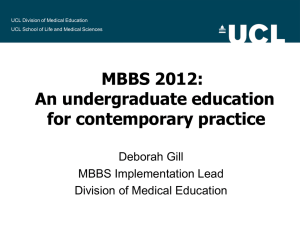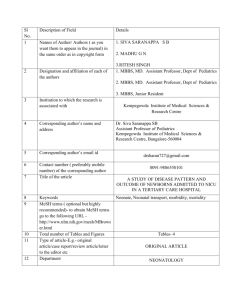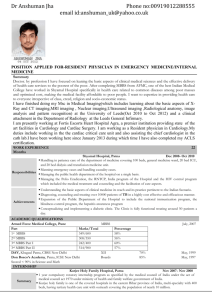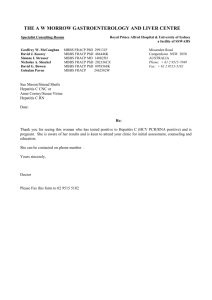MBBS 2012 An undergraduate education for contemporary practice
advertisement
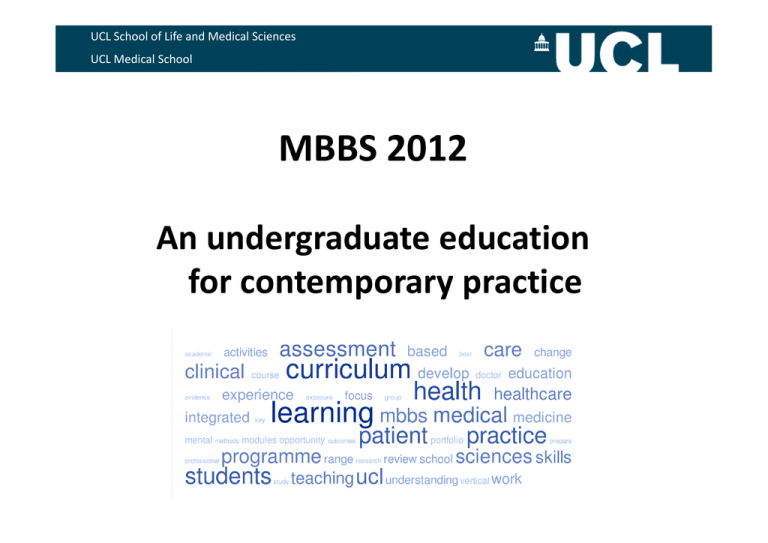
UCL School of Life and Medical Sciences UCL Medical School MBBS 2012 An undergraduate education for contemporary practice UCL Medical School Developing & managing the MBBS programme at UCLMS • There has been an MBBS programme at UCL for a very long time • UCLMS represents the merger of three smaller medical schools each with their own traditions, programmes, practices • UK undergraduate medical programmes are overseen by the GMC (Tomorrow’s Doctors) • Medical curricula – – – – make complex demands of students and staff address complex learning are complexly organised, delivered , governed and assessed Are high stakes Influences GMC Patients UCLP Local healthcare provider landscape UCL MBBS programme Education theory and research NHS workforce planning UCL MBBS 2012:The starting point..the UCL doctor A highly competent and scientifically literate clinician, equipped to practise patient-centred medicine in a constantly changing modern world, with a foundation in the basic medical and social sciences. MBBS 2012: The Vision • Provide the best possible student experience • Reflect the needs of today’s and tomorrow’s patients • Create 21st century doctors able to thrive in modern healthcare environments • Maximise the benefits of learning medicine at UCL Countdown to a new MBBS programme • • • • MBBS review: 2007 (600 stakeholders) Phase 1 implementation: 2008 (structural changes) Phase 2 review and recommendations: 2009/10 Phase 2 implementation project: March 2010 –September 2012 – Set-up of working groups and governance group; appointment of project manager; outline planning, etc. • External review: October 2010 & February 2011, October 2011: – Reviewed of plans, reports of working groups and recommendations generation of further recommendations, initiation of ‘mini work groups’ • Final year : September 2011-2012 – Initiation implementation groups for detailed planning & timetabling – Pilot projects and prototype testing – Extensive communication & staff development • September 2012 – Roll out in all 6 years – Implementation groups become management and review groups – Detailed evaluation Features of the New MBBS Programme • The best possible student experience – More integration of the basic and clinical sciences – More small group work and use of the virtual learning environment, with a focus on synthesis of learning – BSc integrated into the MBBS programme – Attention to vertical themes throughout all years – Longer, more generic, clinical attachments – Contemporary assessments that are fair, relevant and help to prepare for practice and life long learning Features of the New MBBS Programme • The needs of today’s and tomorrow’s patients – Focus on patient pathways – Early extended patient contact – Preparation for practice: • Shadowing and assistantships • Preparation for practice year – Focus on contemporary practice and UCLP priorities: • Social determinants of health • Mental health • Patient safety and quality improvement Features of the New MBBS Programme • Create 21st century doctors, able to thrive in modern healthcare environments – Preparation for practice: • E-Portfolio • Exposure to a range of healthcare delivery venues and practices • Blended learning – Focus on contemporary practice: • Leadership & professional practice • Anatomy and Imaging • Use of evidence Features of the New MBBS Programme • Maximising the benefits of studying medicine at UCL • Learning within an academic health sciences centre environment • Maintaining a strong, focused basis in the fundamentals of underpinning science • A focus on contemporary practice and UCLP priorities • An integrated BSc embedded in the MBBS course, providing a year of scientific study in depth • Creating opportunities to learn within the world famous UCL partners • Attention to the global health agenda The UCL MBBS Programme PATIENT PATHWAYS VERTICAL THEMES PORTFOLIO PROGRESSION Year 1 - Fundamentals of clinical science 1 Assessment Year 2 - Fundamentals of clinical science 2 Assessment Year 3 - Scientific method in depth ( iBSc ) Assessment Year 4 – Integrated clinical care Assessment Year 5 - Life cycle Assessment Year 6 - Preparation for practice Assessment Foundation Programme Horizontal Structures Year 1: Fundamentals of clinical science 1 Year 2: Fundamentals of clinical science 2 Year 3: Integrated BSc Year 4: Integrated clinical care Year 5: The life cycle Year 6: The preparation for practice Year 1 & 2 Year 1& 2: Fundamentals of clinical science • Foundations module • systems based modules • Vertical modules activity every week including meaningful early patient contact • Post examination weeks – Year 1: extended opportunities for early clinical practice – Year 2: Doctor as scientist and scholar • Portfolio and end-of-year assessment Year 3 Integrated BSc • • • • Integrated, not intercalated: enhances learning on MBBS Taken by all students in year 3 Consistency across the courses with orientation to the practice of medicine Continued attention to medical learning (via portfolio) Year 4 the vision Integrated clinical care • Three 12-week blocks, based mainly at the three central sites & in primary care • Focus on foundation skills and understanding and providing clinical care in the modern NHS • Sites provide comparable experience rather than uniformity of experience: each site has a different ‘flavour’ • Students maintain an e-portfolio of learning, including workplace-based assessment (WPBA) • Extensive use of GP placements • Vertical modules learning is ‘everybody’s business’ Integrated clinical care Module A • Includes learning in acute admission : ED and the AAU, medical and mental health problems Module B • Includes movement (medical and surgical) and digestive health (medical and surgical) • Includes time dedicated to operative care led by anaesthetists Module C • Includes metabolic medicine, neurology (medical and surgical), infectious diseases and haematology Year 5 the vision The life cycle • Three 12-week blocks • based in the three central sites but more extensive use of district general hospitals and community providers for placements to increase the exposure to both case load and service delivery models • Sites provide comparable experience rather than uniformity of experience: each site has a different ‘flavour’ • Students maintain an e-portfolio of learning, including workplace-based assessment (WPBA) • Significant use of GP placements • Vertical modules learning is ‘everybody’s business’ The Life Cycle Module D • addresses women’s and men’s health Module E • addresses child and family health Module F • Includes ageing and palliative care and specialist practice (in patient psychiatry, eyes, ears, cancer) Year 6 Preparation for practice • Two blocks of 16 weeks, mainly at distant sites and general practice • Elective and SSCs including post exams SSC • Focus on preparing for practice: student selected components, elective, student assistantships, education supervision and workplace based learning • Students submit a portfolio of learning • Finals early May allowing students the opportunity to resit and still take up Foundation post Vertical Modules – Key to students’ understanding of medicine as an integrated whole – Delivered through a range of activities – Delivered both in centrally organised activities everybody’s business: module leads ensure aspects of the vertical modules topics are addressed within the module and in workplace based learning: – Equivalent to approximately one day per week across the programme Vertical Modules 1. Vertically organised modules: the integrated vertical strands 2. Student centred learning, Patient centred learning 1. Overarching themes Vertical Modules: integrated vertical strands • Through all 6 years • Addressing factual knowledge and skills connecting science & clinical medicine: – – – – – Pathological sciences Anatomy and imaging Use of medicines Use of Evidence Clinical skills and practical procedures Vertical Modules: Student centred learning, Patient centred learning – Authentic e-portfolio – Student selected components: mapped to ensure attainment of a range of skills and outcomes – Patient Pathways (disease progression and management & care pathways; focus on the patient experience) Vertical Modules: Overarching themes – Synthesis & Professional Practice – Mental Health – Social Determinants of Health Teaching methods Assessment Cohesive strategy: – All years have in-course assessment managed via the portfolio and end-of-year progression tests – ‘Basket’ of assessments to ensure reliability and feasibility – Re-sits at key times: years 1, (2) and finals – Finals early enough to allow a student to re-sit and graduate the same year and take up their Foundation post MBBS 2012 • A time of great change for us • Need to evaluate and continue to modify • An ever changing healthcare provider landscape needs to be part of the vision • Teachers need to ensure a consistent message with the overall vision • GMC visit in 2013 was successful so good first measure MBBS 2012: a review of the journey so far Deborah Gill Lead for the MBBS programme We have lift off…. • Pilots and prototypes in 2010/11 and 2011/12 • Year 1,2, 3 ,4 and 6 in new curriculum format • Year 5 in transition for full implementation in 2013/14 Successes • Lots of different rockets launched! • Year 1,2, 3 ,4 and 6 in new curriculum format • Year 5 integrated assessment • E-portfolio • New personal tutor system • New vertical modules introducing integrated mental health, social determinants of health, patient centredness and patient pathways, anatomy and imaging • New formative assessments in years 1 and 2 • Programme design seems to tolerate health service reconfiguration Issues arising… • Failure to launch • Poor trajectory/design faults • Unhappy crew/action denounced as hostile …….but no crashes (yet!) GMC review (a problem focused review) The School has recently reviewed its curriculum and the new curriculum became fully operational in September 2012. While we found some initial problems with the roll out of the new curriculum, we also found that the School was acting to address these concerns, for example, by rectifying timetable clashes and updating student guidance documents. [j1] Failure to launch • No patient pathways in mental health or mother and baby • Little in way of vertical modules seen as everybody’s business • Limited integration of BSc • Very limited use of the community (where care is being delivered) beyond GP teaching Poor trajectory/design faults • Some rather last minute design leading to poorer quality product in first iteration • Menu of activity seen as ‘clashes’ • Integrated module management and administration is problematic • Moodle as currently used is not fully supportive of the curriculum • Differences between sites seen as unfair Unhappy crew/action denounced as hostile • Integrated module make for confused and disgruntled teachers, administrators and students – especially in the first iteration • Episodes of non-engagement by senior teachers (doing it the old way or no shows) • Game of ‘trumps‘ with what activities are most important • Some marginalisation of VMs and GP teaching as ‘taking up too much curriculum space’ • Move to VLE seen as ‘taking away our teaching’: with informal curriculum emerging • Change in finals and within year re-sits not supported by UCL The ongoing mission.. • Important to not loose momentum now the exciting launch is over • Curricula evolve and so new changes will be needed in the bedding down period • Need to take staff and students with us and ensure moving forward feels safe and the right thing to do • Review structural issues that impede delivery New for 2013/14 New year 6 Launch of mother a baby patient pathway Extension of e-portfolio to years 4-6 Changes to formative and summative assessments in years 1 and 2 • Preparation for movement of finals to Easter term • Some evaluation outcomes….watch this space • • • •
